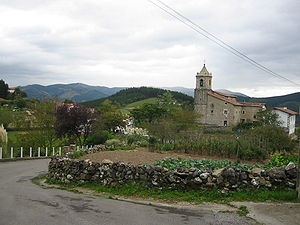
Elizate
Encyclopedia

Basque language
Basque is the ancestral language of the Basque people, who inhabit the Basque Country, a region spanning an area in northeastern Spain and southwestern France. It is spoken by 25.7% of Basques in all territories...
term that refers to an early form of local government in the Basque Country which was particularly common in Biscay
Biscay
Biscay is a province of Spain and a historical territory of the Basque Country, heir of the ancient Lord of Biscay. Its capital city is Bilbao...
but also existed in the other provinces. It literally translates as "church door" (eliza "church" + ate "door"). In Spanish
Spanish language
Spanish , also known as Castilian , is a Romance language in the Ibero-Romance group that evolved from several languages and dialects in central-northern Iberia around the 9th century and gradually spread with the expansion of the Kingdom of Castile into central and southern Iberia during the...
it is called anteiglesia ("before [the] church") .
The peculiar name derives from the Basque custom where the family heads of a settlement connected to a particular parish
Parish
A parish is a territorial unit historically under the pastoral care and clerical jurisdiction of one parish priest, who might be assisted in his pastoral duties by a curate or curates - also priests but not the parish priest - from a more or less central parish church with its associated organization...
would gather after mass at the entrance of the church to make decisions regarding issues affecting their community. Their medieval history is closely linked to the emergence of the Batzar Nagusiak or "Grand Meetings", especially those of Biscay and Gipuzkoa (Juntas Generales
Juntas Generales
The Juntas Generales are representative assemblies in the Southern Basque Country that go back to the 14th century. The three main Juntas Generals in the Basque Country were - and are - the Juntas Generales of Biscay, the Juntas Generales of Gipuzkoa and the Juntas Generales of Álava.They were...
de Vizcaya/Guipúzcoa in Spanish) and the establishment of parochial churches. Each elizate would elect a representative who would represent the elizate at a Batzar Nagusia, so the elizate represents an early form of local democracy. These enjoyed considerable autonomy in decision-making from the higher administrative authorities.
An elizate was steered by a fiel sindiko (fiel síndico in Spanish), who would organise meetings and bear a makila
Makila
The makila is a traditional Basque walking stick, and is notable as both a practical tool and a cultural symbol of authority and strength.-Etymology:...
as a sign of authority. A fiel was normally chosen for one year through a number of methods. Some were nominated by the outgoing fiel, in some places the position of fiel would rotate through all farmholders of the elizate and in others the most recently married farmholder would be named fiel. Each elizate was subdivided into smaller units called kofradiak (cofradías in Spanish, "brotherhoods") which corresponded to the individual boroughs of an elizate.
A group of elizates was a merindad
Merindad
Merindad is a Mediaeval Spanish administrative term that refers to a country subdivision smaller than a province but larger than a municipality. It was roughly approximate to the English count or bailiff...
.
Through time elizates often became municipalities. In Biscay, during the time of the Lordship of Biscay
Basque señoríos
The Basque señoríos were medieval hereditary land titles over an area called señorío , recognized by a king to former basque chieftains in relation to the concept of manorialism in exchange for sworn allegiance. The Basque term is jaurerria , means "lord's country" and usually relates to the...
(Bizkaiko Jaurerria in Basque, Señorío de Vizcaya in Spanish), the elizates were referred to as the Lur Laua (Tierra Llana or "plain land" in Spanish) as opposed to the more stratified cities) and were further incorporated into the administration. They became subject to the fueros
Fuero
Fuero , Furs , Foro and Foru is a Spanish legal term and concept.The word comes from Latin forum, an open space used as market, tribunal and meeting place...
which at the same time re-affirmed the status of nobility to all farmholders. This meant that unlike in most of feudal Europe, the farmers legally owned their land.
After centuries of political change, very few elizate remain today, two of the most notable in Iurreta
Iurreta
Iurreta is a town and municipality located in the province of Biscay, in the autonomous community of Basque Country, northern Spain. Iurreta is home to Basque radio and television broadcaster Euskal Telebista....
and Derio
Derio
Derio is a town and municipality located in the province of Biscay, in the autonomous community of Basque Country, northern Spain. It's part of Greater Bilbao and was part of the municipality of Bilbao until 1983 and hosts Bilbao's biggest municipal cemetery. It has a population of 5,107 .-External...
.
See also
- The Water Tribunal of Valencia, Spain is unrelated to elizates, but also holds sessions at the church door.
External links
- Anteiglesia in the Spanish-language Auñamendi Encyclopedia.

